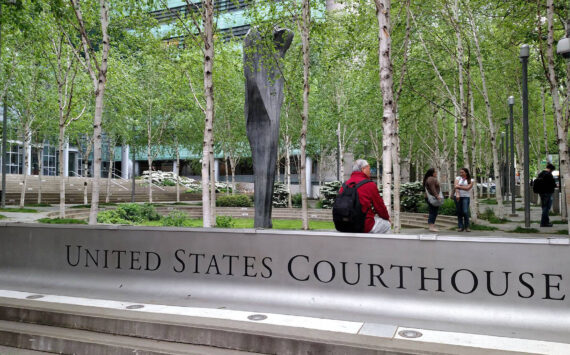Intrigue! Excitement! Mystery! And all in Seattle’s ever-dull City Hall!
Yes, that’s what went on late last week when anonymous tipsters dished some dirt about council member Heidi Wills’ driving record on the eve of a big vote. Wills had stated previously that she would cast the fifth and decisive vote against scaling back the city’s program to impound the cars of drivers caught motoring without a valid license.
And, sure enough, a check of Seattle Municipal Court files shows that Wills can indeed be Heck on Wheels.
Heidi the council member is staying mum about Heidi the motorist. “If you’d care to talk about a policy decision, I’d discuss it with you,” she says. “But my personal life is personal.”
The court records of elected officials are personal? Yeah, right.
Granted, poor Heidi grew up in Seattle and went to college here, so every youthful parking ticket and moving violation is easily accessible to her critics. But it’s still amusing to discover that this vocal critic of the auto society has racked up 47 citations in a dozen years. Maybe she left that U-Pass in her other purse.
Sure, some immature media types might not be able to keep a straight face while reporting that Wills received her last three tickets (all in 1999) for illegally parking in spaces reserved for carpools, but. . . . Bwa-haa-haaa-haaa! OK, we can’t keep a straight face either. And let’s not get started about that 1993 citation for failing to yield to a pedestrian in a crosswalk.
All ridicule aside, Wills shouldn’t have stonewalled on the entire issue of her record as a driver. Most voters secretly enjoy finding out that their elected leaders aren’t perfect. And perhaps this is a good cue for other local political leaders to cool the anti-auto rhetoric—people in many occupations (including City Council members) work shifts that don’t mesh with public transit schedules or simply need to drive to perform their jobs. Happy motoring!
Speaking of cars
As if Tim Eyman needed more critics—his road-funding Initiative 745 is now being opposed by a coalition of environmental, labor, and business groups called Citizens for Real Transportation Choices.
At a press conference last week, leaders of the new coalition lampooned the road-building measure’s big donations from road builders such as Superior Asphalt ($50,000), Lakeside Industries ($50,000), and the industry organization Washington Asphalt Pavers ($30,000).
With the deadline looming to qualify for this fall’s ballot, members of the coalition urged Washington voters not to sign the initiative, which calls for moving 90 percent of the state’s transportation funds to road construction and maintenance (thereby de-funding public transit and the state’s ferry system).
Eyman says he’s not worried about the competition. “We believe the only enemy we face with our initiative is the calendar,” he says, “because July 7 is coming real fast.”
Belcher belches on
She’s wisely decided to retire as state lands commissioner, but Jennifer Belcher remains obsessed with her quixotic quest to rid our shores of those evil folks who live aboard their boats.
Belcher was sighted on Lake Union earlier this month, leading another press tour to point out the legally moored boats of law-abiding citizens she’s trying to evict. Commissioner Lame Duck is still peddling her tired refrain that live-aboard boaters moored on state lease lands are the moral equivalent of someone who built a home in a state park. That’s nonsense. State lease lands aren’t parklands, they’re public property leased to private marinas for a fee (which, presumably, goes into our state coffers and benefits the public as a whole).
Belcher’s latest line is equally curious. Although the former state legislator was a prime author of the 1984 law that she now claims bans live-aboards on state lease lands, no such prohibition is specifically included in the text. Even a legislative analyst who worked with her in drafting the law recently told Seattle Post-Intelligencer reporter Scott Sunde that the status of live-aboards wasn’t even discussed during debate.
Belcher’s comeback—that she
wrote the law, so she knows what it really means—doesn’t wash. Appellate courts have consistently rejected the argument that legislative intent trumps the letter of the law—or, in simpler terms, if Belcher had wanted the law to ban live-aboard boaters, she should have written it that way.
Pick it up, folks
Things have slowed to a crawl up on the 11th floor of City Hall.
To illustrate this point, check out last week’s editions of the Seattle Weekly and The Stranger, both of which included major pieces griping about two different council votes that hadn’t even taken place. (At least we chose to complain about an issue on which all nine members had declared their votes in advance.)
What’s causing the slowdown? Blame (or credit) a divided council. In the old days, members could travel to conferences and take vacations without worrying about delaying an important vote, because very few votes were close. Now, with narrow divides on such topics as the aquarium agreement, the amendments to the city’s auto impound ordinance, and the fate of the proposed Admiral neighborhood parking garage, major votes are being put off week after week simply because a single council member is absent.
Not that anyone’s complaining—after a decade of 9-0 votes, we’d call this “progress.”






